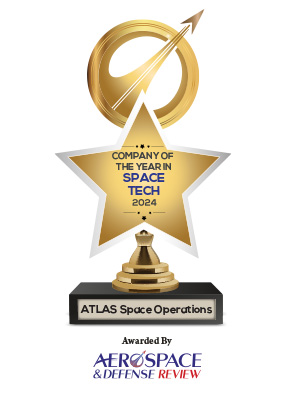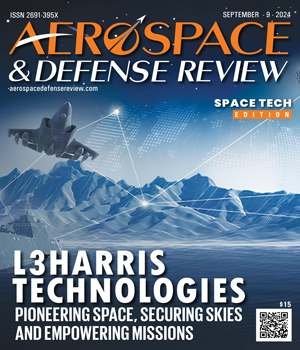THANK YOU FOR SUBSCRIBING
 John Williams, CEO
John Williams, CEOThis groundbreaking model allowed satellite operators to shift their focus from building and maintaining costly ground infrastructure to concentrating solely on their missions. ATLAS’s global federated antenna network seamlessly managed the complex tasks of ground station operations which set a new standard that soon became the industry norm.
While many saw this as the pinnacle of space communications technology, it was just the beginning of ATLAS’s larger vision. Its true ambition was to provide space operators with uninterrupted, universal access to space. This vision led to the development of an even more transformative offering—Freedom™ Ground Software as a Service (GSaaS), a ground network management system inspired by advancements in cloud services and the software-as-a-service (SaaS) model.
“By integrating the capabilities of SaaS into the GSaaS framework, ATLAS can offer customers much more than just network infrastructure for antenna time,” says John Williams, CEO of ATLAS Space Operations. “They benefit from exceptional software that bridges the satellite and antenna, making data downlinking to and from space more seamless, simplified, efficient and cost-effective than ever before.”
The proprietary network management software automates communication processes, pre-plans satellite passes, and eliminates the need for satellite owners to act as ground station operators. The aim is to solve a common challenge in satellite ground systems—overcoming the rigidity and complexity of legacy systems. With cloud-based GSaaS, data sharing is now seamless and accessible without the need for customers to develop complex software solutions.
Innovation with a Purpose
The bold move toward GSaaS couldn’t be more timely as the demand for data transmission to and from space surges.
The traditional approach of training a team, developing software and establishing cloud-based access to an antenna is time-consuming and costly. Customizing software for mission-specific operations adds to the complexity and expense.
ATLAS’s approach simplifies this increasingly complex problem as data scales up through a multifaceted approach. Its global federated antennas and modems, powered by Freedom software, consistently process data using a uniform API. This approach accommodates various data transmission methods, whether radio frequency, optical or space relay. A customizable feature meets each client’s operational demands, significantly reducing technical configuration complexity and cost.
Customers can schedule antenna time according to their operational needs and business models, facilitating secure data collection and satellite communication. As their operations evolve, they can upgrade the services without any need for software reconfiguration, as the API remains consistent.
“Preparing to launch at a moment’s notice is no small feat. I extend my heartfelt congratulations to the entire Boeing Millennium team for their remarkable achievements,” states Williams.
-
The proprietary network management software automates communication processes, pre-plans satellite passes, and eliminates the need for satellite owners to act as ground station operators
Security is the cornerstone of ATLAS’s commitment to protecting customers’ data. This dedication is evident in its accreditation by the National Institute of Standards and Technology (NIST), showcasing its ability to meet the rigorous standards set forth by the U.S. government.
ATLAS is also on the brink of achieving its next certification milestone with an impressive 80 percent of the journey toward operating within classified government clouds already completed. This significant achievement will further distinguish its position in the competitive marketplace.
Global Satellite Links for Uninterrupted Connectivity
One of the biggest benefits of partnering with ATLAS is its technology-agnostic approach, accommodating customers’ diverse satellite orbit needs. This includes low-earth orbit (LEO), geostationary orbit (GEO) or any variations in between, such as polar or equatorial orbits and circular or elliptical paths.
This flexibility is crucial. “We recognize the process of getting data from the spacecraft to the ground largely depends on geographic factors and the ability to maintain a line of sight with the satellite for data transmission. Effective communication links often require significant CapEx from customers,” explains Williams.
Many of the 50-plus antennas in ATLAS’s global network are not even owned by ATLAS. By leveraging other providers’ CapEx, ATLAS maintains a lean operation while delivering top-notch solutions that exceed customer expectations. It’s a win-win situation. Customers get cutting-edge technology, and ATLAS stays agile in an ever-evolving market.
The extensive network of antennas is connected through strategic partnerships with Amazon Web Services (AWS) and ViaSat’s Real-Time Earth ground station capabilities. These partnerships provide customers with increased access time to antennas anytime and anywhere, reducing data latency for transmitting data to and from space. The universal compatibility of these systems supports the evolving marketplace by advancing the integration of various data transmission methods, including mixing radio frequency with optical communications and incorporating space-to-ground and space-to-space relays. Managing these diverse networks through a single, user-friendly interface simplifies the process for customers, allowing them to align perfectly with their operational needs.
These capabilities were validated when ATLAS was selected for the ground segment support for Blue Origin’s upcoming Blue Ring mission, DarkSky-1. By leveraging its highly capable seven-meter antennas across a strategic global footprint, ATLAS is meeting the radio frequency requirements of this and future cislunar and lunar Blue Ring missions, ensuring reliable, adaptable and efficient access to space.
Powering the Future of Space Communication
Combining its entrepreneurial teams and innovative culture focused on customer needs has resulted in ATLAS’s 100 percent renewal rate on current work. This is centered on its philosophy, which is tied to the customer’s success—a win-win relationship.
The recent establishment of a wholly owned subsidiary, Freedom Space Technologies (FST), marks another win for ATLAS in securing and executing multiple classified U.S. government contracts. Since the foundation of FST, ATLAS’s revenue momentum has grown twofold year-over-year. This rapid growth trajectory has been creating more opportunities for ATLAS, such as geographical expansion and incorporating machine learning capabilities in the software.
These achievements illustrate that ATLAS has not only opened the door to a world of boundless space technology possibilities but has also laid the foundation for a future in which the rules of space-based communication are being rewritten with a customers-centric SaaS approach.
| Share this Article: |
ATLAS Space Operations
Company
ATLAS Space Operations
Management
John Williams, CEO
Description
ATLAS Space Operations changed the face of the space communication industry forever by pioneering the concept of Ground Station as a Service. While many saw this as the pinnacle of service, it was just the beginning of ATLAS’s larger vision of providing space operators with uninterrupted, universal access to space. This vision led to the development of Freedom™ Ground Software as a Service (GSaaS).






